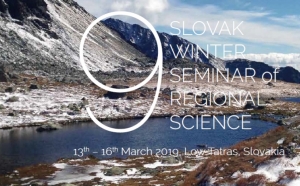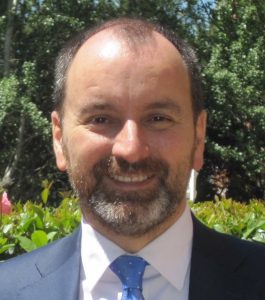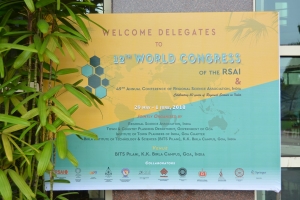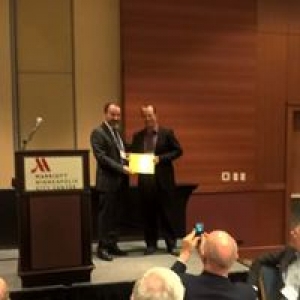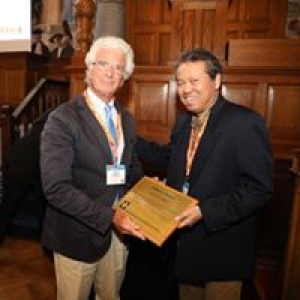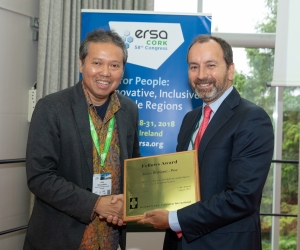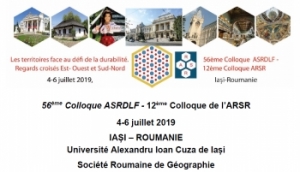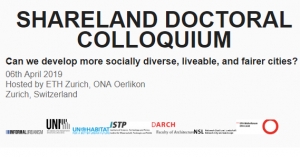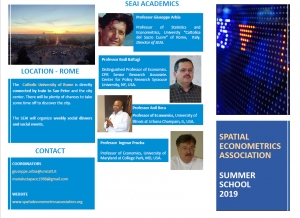Warning
JFolder: :files: Path is not a folder. Path: /home/regionalh/www/images/
×
There was a problem rendering your image gallery. Please make sure that the folder you are using in the Simple Image Gallery Pro plugin tags exists and contains valid image files. The plugin could not locate the folder: images/
The main objective of the annual Winter Seminar is to bring creative academic debate on actual issues of regional science and practice of regional This seminar is organized by Andrés Rodríguez-Pose, London School of Economics and Political Science, UK. Andrés Rodríguez-Pose is a Professor of Economic Geography at the London School of Economics, where he was previously Head of the Department of Geography and Environment. He is the immediate Past President of the Regional Science Association International (2015-2017). He served as Vice-President of the RSAI in 2014 and has also been Vice-President (2012-2013) and Secretary (2001-2005) of the European Regional Science Association. He is a regular advisor to numerous international organizations, including the European Commission, the European Investment Bank, the World Bank, the Cities Alliance, the OECD, the International Labour Organization, the Food and Agriculture Organization, the Inter-American Development Bank, and the Development Bank of Latin America. Important Dates The ERSA French Speaking Section and Romanian Section are happy to inform that the deadline for submitting special session proposals for their joint event, has been extended to the 15 December. More info about the Call in English and French can be found below Thematical Colloquium Proposal – Call for Special Sessions – Submission Form Proposition de thématique du colloque – Appel à proposition de sessions spéciales Fiche proposition de session spéciale 2ndCall | The International Congress on Sustainable Development, Public Management and Territorial Governance (28-31 May 2019, Poland) The International Congress on Sustainable Development, Public Management and Territorial Governance WSB University, Faculty of Applied Sciences The International Congress on Sustainable Development, Public Management, and Territorial Governance are organized in cooperation: Working agenda: 28thMay 29thMay 30thMay 31stMay This event will explore the ongoing dynamic, emerging issues and future challenges regarding territorial governance and public management as well as the other fields of research that may have an influence on sustainable development. Contextually, several themes will be addressed, namely: Public Management; Territorial Governance and Strategies; Cross-Border Cooperation and Inter-Regional Cooperation; Inter-Organizational Cooperation; Sustainable Planning; Sustainable Development; Smart Cities; Biodiversity Policies and Strategies; Accessibility and Connectivity Transport Systems; Sustainable Tourism Management; Sustainable Culture Management; Renewables Energies; Circular and Green Economy; Environmental Rights and Legislation; Migratory fluxes - Strategies, Management and Planning. Early registration should be open until February 17, 2019. However, late registration will be possible as well. The registration deadline is April 30, 2019. Registration forms should be sent to the following address www.wsb.edu.pl/congress (conference registration). Registration fees: Early Registration – 280,00 €; Late Registration – 350,00 €; Student (subject to confirmation) – 200,00 €. The payment should be made by April 30, 2019 to the bank account: ING Bank Śląski S.A.; 40-086 KATOWICE UL.SOKOLSKA 34; Poland code BIC (SWIFT) INGBPLPW Transfer name: „Congress 2018” + the name of the participant Abstracts and papers in English, Portuguese or Spanish should be submitted to the following The submitted abstracts will be reviewed by the Congress Scientific Committee, according to the adequacy of the contents of the Congress topics. Please submit an abstract of no more than 200 words. Posters may also be submitted – the authors should use the specific format available on the congress website. The submission process will take place between November 1, 2018, and April 30, 2019. Successful applicants will be informed on a regular basis, no later than May 5, 2019. The deadline for full papers is May 24, 2019. The publication of the works in a Book of Abstracts (with ISBN) is foreseen as the Congress outcome. The best works will be invited to be published - as a book chapter - by the prestigious publisher “Thomson Reuters”(7thworldwide position in scientific publications) – an additional payment of Other works will be reviewed for possible publication in Scientific Journals associated with the event: Sustainability (ISSN 2071-1050)– special issue: Sustainable Cross-Border Cooperation: Common Planning, Policies, Strategies, Methods and Activities(Editors: Joanna Kurowska-Pysz, Rui Alexandre Castanho, Luís Loures) – publication fee according to the price list Regional Science Policy & Practice(ISSN 1757-7802)– special issue: New trends and Dynamics on Territorial Management and Governance (Editors: Rui Alexandre Castanho, Joanna Kurowska-Pysz, Katarzyna Szczepańska-Woszczyna) – publication fee according to the price list Forum Scientiae Oeconomia(ISSN 2300-5947), an international journal published in Poland, indexed in: EBSCO, ARIANTA, BazEkon, CEEOL, ERIH Plus, Google Scholar, Index Copernicus, PBN - Polska Bibliografia Naukowa, DOAJ (accredited by Polish Ministry of Science and Higher Education – 7 points) - no publication fees. Revista Monfragüe Desarrollo Resiliente(ISSN 2340-5457) -the journal focuses on scientific works regarding the approach of resilience, as a more concrete approach than the traditional concept of Congress participants shall cover the publishing costs and pay fees directly to the publishers after the paper has received positive reviews. If the proposal is accepted and the participant cannot attend the event, it is possible to send the poster – still, the registration payment is required. Accommodation costs are not included in the congress fee. Suggested accommodation: Holiday Inn**** Dąbrowa Górnicza https://hidabrowa.pl/en/ Pogoria Residence*** Dąbrowa Górnicza http://www.pogoriaresidence.pl/en/ booking - until places are empty, 15thApril at latest please contact with the hotel using its online booking system in the correspondence use the contact password: WSBUniversity the prices: 179 pln single / 233 pln double Congress languages: preferably English, however Polish, Portuguese and Spanish can also be used (especially during parallel sessions). Contact persons: Joanna Kurowska-Pysz, Rui Alexandre Castanho, Julian Mora Aliseda Hope to see you in Poland. Organizers Fully funded PhD Opportunity on 'Web archives and cities: mining the web to learn our cities' hosted by the University of Birmingham and The Alan Turing Institute. The project will explore how the dynamics of cities are reflected in and, therefore, can be sensed by mining online content. It will utilise an innovative data source of billions of archived web pages under the .uk domain during the period 1996-2013. It will exploit the unstructured textual data contained in these webpages in order to understand the changes that cities in the UK have undergone. We are looking for a student with: - Relevant social science background in either geography/planning/urban studies or linguistics. Alternatively, a computer science background and willingness to engage with the above disciplines. - Strong computational background including experience in R or Python. - Good statistical knowledge. - Preferably, experience in Natural Language Processing and Machine Learning. Supervisors: Dr Emmanouil Tranos and Prof Jack Grieve More details: Deadline: Tuesday, January 22, 2019 SHARELAND DOCTORAL COLLOQUIUM Can we develop more socially diverse, liveable, and fairer cities? 06th April 2019 OPEN CALL The colloquium will bring academic rigour and propose ideas within international and national frameworks, while also providing participants with the chance to share and discuss their work with both their peers as well as internationally renowned practitioners. Maximum participants: 20 Important Dates: Call for participation Summer School of Spatial Econometrics Advanced Institute – SEAI 2019 May 13th to June 7th, 2019, Rome (Italy) The 12th edition of SEAI Summer school will take place next May at the Catholic University of the Sacred Heart in Rome (Italy). The Spatial Econometrics Advanced Institute (SEAI) is the advanced school of the Spatial Econometrics Association. It is held yearly and it consists of a 4-weeks course. It is a unique opportunity to be introduced to the methods and practice of Spatial Econometrics by the leading experts in the field. Classes: Week I: 13th-17th May Spatial Statistics Prof. Giuseppe Arbia, University “Cattolica del Sacro Cuore ” of Rome. Week II: 20th-24th May Spatial econometrics Prof. Anil Bera, University of Illinois at Urbana-Champain. Week III: 27th – 31st May Econometric Methods for Spatial and Social Networks Prof. Ingmar Prucha, University of Maryland, College Park, Maryland. Week IV: 3th-7th June Panel data Prof. Badi H. Baltagi, Syracuse University, Syracuse, New York. The program of activities includes: How to apply All details may be found at: http://www.spatialeconometricsassociation.org/prova/home-advanced/Notice
Elisabete Martins
9th Slovak Winter Seminar | 13–16 March 2019, Low Tatras, slovakia
9th Slovak Winter Seminar of Regional Science,
13th – 16th March 2019, Low Tatras, slovakia
policy by an attractive environment and relaxed atmosphere. Accepted articles will be published in the conference proceedings “9th Slovak Winter
Seminar of Regional Science 2019” with ISBN.
Society for Regional Science and Policy – Slovak Section of European Regional Science Association
Department of Public Administration and Regional Development, University of Economics in Bratislava
Polish Section of European Regional Science Association
Abstract submission deadline: December 31, 2018
Participation fee payment: January 31, 2019
Paper submission deadline: February 15, 2019
Winter Seminar: March 13 – 16, 2019
12th World congress of the RSAI, 29 May-1 June, 2018
RSAI Awards 2016
RSAI Awards 2017
RSAI Awards 2018
ASRDLF and RRSS Joint event – Extended deadline for the Call for special sessions
56th Colloquium of the ASRDLF and 12th Conference of the Romanian Regional Science Association
4-6 July 2019, ”Al.I. Cuza” University of Iasi, Romania
2nd Call | The International Congress on Sustainable Development, Public Management and Territorial Governance (28-31 May 2019, Poland)
28-31 May 2019, Dąbrowa Górnicza, Poland
- WSB University, Poland
- University of Extremadura, Spain
- Polytechnic Institute of Portalegre, Portugal
- University of Madeira, Portugal
- FISAT.
The congress will take place between 28 and 31 May 2018, at the Faculty of Applied Sciences,
WSB University, in Dąbrowa Górnicza, Poland.
Opening Ceremony & Gala Dinner (starting at 7 p.m.)
Plenary session, parallel sessions (from 9 a.m. to 5 p.m.), trip to Katowice, social dinner at 7 p.m.)
Parallel sessions, poster session (from 9 a.m. to 5 p.m.), social dinner at 7 p.m.
Closing session, trip to Cracow with Gala Lunch (ending at 5 p.m.)
IBAN / account number: PL 05 1050 1227 1000 0023 3028 9576
e-mail address: This email address is being protected from spambots. You need JavaScript enabled to view it.
300,00€ - the guidelines for authors could be found on the event website.
"Sustainability". Thus, the journal provides an open space of reflection and rigorous debate,
for those who intend to enter the study of the resilient development - no publication fees.
booking - until places are empty, 15thApril at latest
please contact with the hotel using e-mail: This email address is being protected from spambots. You need JavaScript enabled to view it.
in the correspondents use the contact password: WSBUniversity
the prices: 229 pln single / 279 pln double
e-mail address: This email address is being protected from spambots. You need JavaScript enabled to view it.
Fully funded PhD Opportunity on 'Web archives and cities: mining the web to learn our cities'
SHARELAND DOCTORAL COLLOQUIUM | 06th April 2019, Zurich, Switzerland
Hosted by ETH Zurich, ONA Oerlikon
Zurich, Switzerland
Three thematic tracks:
Submission of abstracts: Please send your abstracts (PDF) of max. 500 words including title, authors and 3-5 keywords to This email address is being protected from spambots. You need JavaScript enabled to view it.. We highly encourage PhD students and Post/Doc researchers to apply (max. 5 years after completion of PhD).
SEAI 2019 | May 13-June 7, 2019, Rome (Italy)
About Us
The Regional Science Association International (RSAI), founded in 1954, is an international community of scholars interested in the regional impacts of national or global processes of economic and social change.

